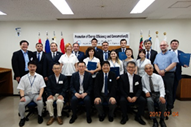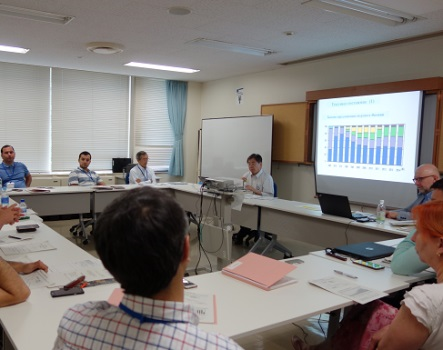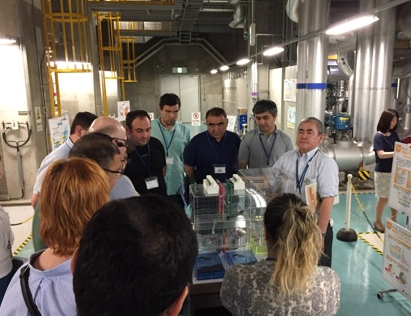ECCJ implemented the training program in Japan for high-efficiency energy utilization and energy conservation promotion (D) in JICA thematic issue training
Under the instruction and financial support of the Japan International Cooperation Agency (JICA), the Energy Conservation Center, Japan (ECCJ) implemented a training project between June 1 and July 4, 2017 giving guidance in Japanese energy conservation activities to 11 trainees (comprising government officials) from CAREC (Central Asia Regional Economic Cooperation) nations. The trainees participated from countries having different energy situations, including countries with few or rich natural resources.

The results of the training were as follows.
1. Country reports were created and presented, allowing trainees to gain an understanding of the energy situations in their countries and energy conservation policies, and enabling them to give an explanation of the problems facing their countries.
2. Trainees could gain an understanding of the current situation of energy policies in Japan, the Energy Conservation Act, and energy conservation promotion activities, and could compare these with the energy conservation policies in their own countries to investigate the possibility of applying them.
3. Through inspection of excellent cases of energy conservation, trainees could gain an understanding of actual and specific energy conservation measures along with their effects and benefits, and could compare these with the situations in plants in their own countries to investigate the differences and the possibilities of applying the measures.
4. Based on the training results of practical energy conservation promotion, implementable policy proposals were created for their countries. The trainees will be able to build the actual systems and propose policies in their own countries.
The lecture and Site visit programs were organized giving considerations to the following items.
(1) Lectures: The necessity for energy conservation, energy conservation policies, the Energy Conservation Act; energy conservation activities, systems and methods in Japan; basic energy management systems

(2) Site visits: Visits were made to inspect specific destinations relating to plant, building and household use energy

(3) Guidance and announcements: Issues in promoting energy conservation, energy conservation small group activities, energy conservation measure promotion
In the training, the trainees created country reports to organize the issues relating to energy conservation in their own countries. They joined group work activities to organize the current situations of energy conservation policy development in their countries and create improvement proposals based on the results. Then, based on the proposals, they determined how to create policy proposals that would realize energy conservation promotion measures in their own countries.
For the trainees, item (3) was a very important training item which formed a major objective of the training. By allowing trainees to experience item (3) as policy managers, it is believed that the training provided an opportunity for them to acquire highly practical knowledge relating to the promotion of specific and practical energy conservation policies.
The results were shown in the policy proposal announcements, which concluded the training program.

